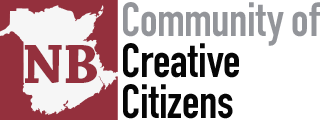People are our most important natural resource. This is a belief that is often lost in natural resource-based economies like New Brunswick’s, where logging, mining, blueberries and transfer payments rule. Fast-paced innovation and advancements in science and technology have resulted in a global shift to a knowledge-based economy, and we now have a disconnect between education and the needs of 21st century employers. For people to be successful in these complex times, it is essential that they have the knowledge, skills, and attitudes necessary to reach their potential so that the economy and society in general, is resourceful and resilient enough to reach its capacity. This will not be achieved through an education system where a standardized curriculum, grade level ceilings, learning to “do school” by passing school-based assessments, ignoring advanced learners and low student engagement prevail. This state of affairs is holding back educational and societal economic progress in our province. Needed to address this unacceptable situation is an education system that is centered on personalization, experiential learning and an enhanced role for community.
Standardization and conventionality are mindsets geared to an economy and society of the past, or to the standard business like the service business. Our public education system was created at a time when standardization was helpful in an industrial economy that needed to leverage assembly line efficiency. Also, as immigrants poured into North America, the school system was expected to condition newcomers to the dominant society and diversity was not valued. Standardization of moral principles, like equity and high expectations for all students, will always be necessary. But we are now stuck in time with our present school system that prizes bureaucratic standardization of expectations and defines it as quality education. But as we all know, conditions have changed, understandably, so should the purposes of schooling. It is past time for New Brunswick educators to be given the support and training necessary to reflect, and act, upon how our standardized approach to education is holding back our students, our society and our economy.
It is not just education that needs to evolve from the one-size-fits all structure. Harvard Professor Todd Rose in his insightful book “The End of Average” shows that no person is average and that we are all unique. Society has learned that environments need to fit the individual and not the average. Rose’s comment that “Any system designed around the average person is doomed to fail” must be heeded by educators as well as business executives, scientists and engineers.
Personalization is a critical concept for dethroning standardization in education. Personalization engages students by connecting learning to their strengths, interests, and needs. Presently, after “passing”, students move in school, as they would on an assembly line, together in batches called grade levels. Educational success is about passing a minimum bar like everyone else. Shouldn’t the goal of education be to nurture creativity, adaptability, and competencies, so that every student reaches their potential?
If educational instruction and support does not facilitate the growth of each individual’s unique skills and capabilities, regardless of their strengths and needs, the system has failed the student. Of course,
there are many outstanding teachers in the New Brunswick education system who do differentiate and provide outstanding learning environments. We applaud their effort and those of the Department of Education and early childhood development for steps they have taken in supporting personalization.
So, what is personalization? It is an educational framework that involves giving students a voice and choice in their learning. To personalize education, teachers must know the students they are teaching holistically. In designing appropriate lessons and learning activities, an individual’s skills, knowledge, strengths, needs, personality and interest should be considered. Personalized education is flexible and provides alternatives and variety with regards to: how students are grouped; the learning environments; pacing; content, topics and themes; how students demonstrate their learning; and how learning is assessed.
Students are given opportunities to explore foundational knowledge and skills through activities and projects that integrate their understanding of concepts and proficiencies in subject areas like literacy, math, and science through topics or themes that are meaningful and relevant to them. Students are made aware of what growth and success looks like and they take responsibility for demonstrating and documenting their learning. Students may work at a faster or slower pace than their peers and in spaces that promote understanding and the transfer of learning beyond the walls of the classroom and into authentic settings and contexts.
Imagine an eight-year old student passionate about the outdoors. Their teacher knows this and gives them a book to read about patterns in nature. Soon, as they walk on the playground at recess, the student sees patterns in the plants and trees growing in their school garden. They are learning about patterns in math and labeling and documenting evidence in science, so they decide to take pictures of the flowers and leaves to show their class what they see. The teacher then encourages the student to create a presentation, helps them learn to research, and provides time and opportunity for them to share their knowledge with others, perhaps even at the STEM expo.
What have these personalized educational experiences taught this student? That foundational skills and competencies like communication, problem solving, math, reading, writing and science are essential, yes. But, just as important, it has nurtured a passion and helped them connect that passion and their proficiencies to a purpose. Education has taught this student that they have value along with the knowledge, skills, tools and strategies to help themselves and others. This is what the people of New Brunswick need from our education system.
Daryl K. Branscombe
COALITION OF CONCERNED CITIZENS
